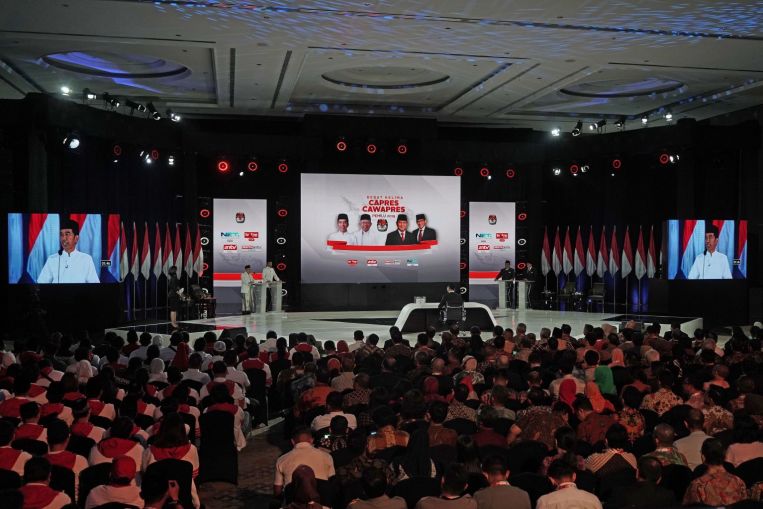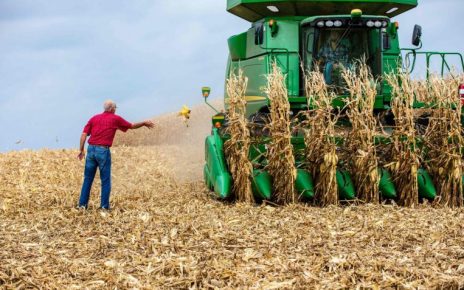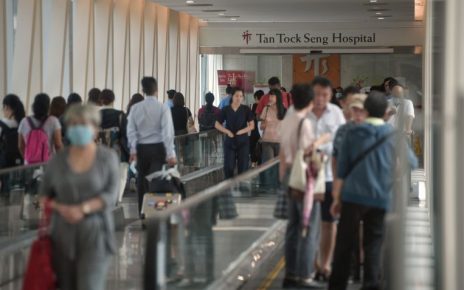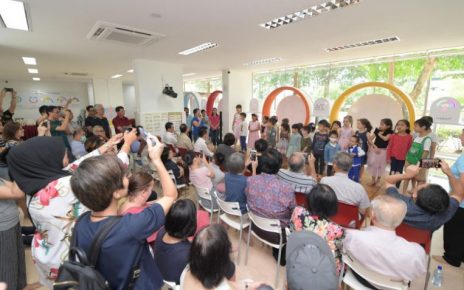
It was a make-or-break moment to sway undecided voters when President Joko Widodo and his challenger Prabowo Subianto
Together with their running mates, they sparred over issues ranging from the economy and social welfare, to finance, investment and industry.
Mr Joko, 57, who is running with prominent cleric Ma’ruf Amin, 76, spoke about his efforts to reduce the economic gap between the most densely populated island of Java and other parts of Indonesia, particularly by building massive infrastructure and creating new economic centres across the vast archipelago of more than 17,000 islands.
He also stressed the importance of pressing on with industrialisation.
“Going forward, we must be brave to build downstream industries, so that we can export finished goods, or at least semi-finished products, rather than just raw materials,” he said.
Mr Prabowo, 67, who has teamed up with former deputy Jakarta governor Sandiaga Uno, 49, however, said Mr Jokowi had done the opposite as the current government does not have a “grand developmental strategy”.
“Pak Jokowi’s will is good, but during the four-year tenure, why have you allowed (more) imports?” he asked, using the President’s popular moniker.
-
Chatbot launched to help identify fake news
-
WAR ON FAKE NEWS
• Kominfo, which is short for Indonesia’s Ministry of Communication and Information Technology, last Friday launched Anti Hoaks, a chatbot program designed to debunk a hoax or fake news. The public can send a question to the chatbot via the Telegram instant messaging application to verify news reports or any other information they may find dubious. “You can ask (the chatbot) based on keywords or send a copy of the article,” state news agency Antara quoted Kominfo director-general for information application Semuel A. Pangerapan as saying.
3-DAY QUIET PERIOD BEGINS
• The “quiet period” for the presidential and legislative elections begins today, and all forms of campaign activities are banned until Wednesday, when polls start.
• This means all candidates, including President Joko Widodo and his rival Prabowo Subianto, their running mates, members of their campaign teams, as well as any member of the public, are banned from engaging in any form of political campaigning, including on social media•.
WEALTH REPORTS
• Indonesia’s General Elections Commission chairman Arief Budiman has released the wealth reports of the four candidates taking part in the presidential race.
• Mr Joko had just over 50.2 billion rupiah (S$4.8 million), as of Aug 14, last year, days after the incumbent registered to contest the presidency. His running mate, senior cleric Ma’ruf Amin, had 11.6 billion rupiah.
• Mr Prabowo’s total wealth reached 1.9 trillion rupiah, while his running mate Sandiaga Uno had around 5.1 trillion rupiah.
“Our economy is set in the wrong direction,” Mr Prabowo added, saying the government has been focusing on infrastructure when it should have paid more attention to developing industrialisation.
Responding to his rival’s criticism, Mr Joko clarified that he is undertaking economic development in stages.
He said his infrastructure push will be followed by enhancement of the quality of local human resources, structural reforms and utilisation of cutting-edge technology.
“Infrastructure we’ve constructed will be connected to industrial estates and tourism centres… We cannot do it overnight – just build it and directly export. We need big steps,” he explained.
The issue of Indonesia’s huge trade deficit, particularly with its biggest trading partner China, also came up during the debate.
Mr Sandiaga asked Mr Joko how he will address the issue in the future.
Acknowledging the problem, Mr Joko said the government has made its best efforts to reduce the trade deficit. While the country’s trade balance recorded a deficit of around US$8 billion (S$10.8 billion) last year, this has come down to US$670 million in the first quarter, he added.
“We need to substitute imports. We must have a petrochemical industry in Indonesia because we import a lot of it. We have also built refineries to slash imports of oil and gas,” he said. “By doing this, the deficit can be eliminated.”
The trade deficit has been the main driver of the country’s current account deficit.
Wednesday’s elections come at a time when South-east Asia’s largest economy is struggling to deal with the impact of unfavourable global headwinds.
Indonesia’s economy slowed in the past few years, with growth hovering at around 5 per cent annually, below the 7 per cent Mr Joko had promised when he first ran for president in 2014.
Last year, the economy expanded by 5.17 per cent, the fastest since 2013, and the government’s aim is to lift it slightly to 5.3 per cent this year.
Mr Prabowo, in his last rally in Surabaya, East Java, on Friday promised supporters he would expand the economy at “double-digit” rates, if elected.



